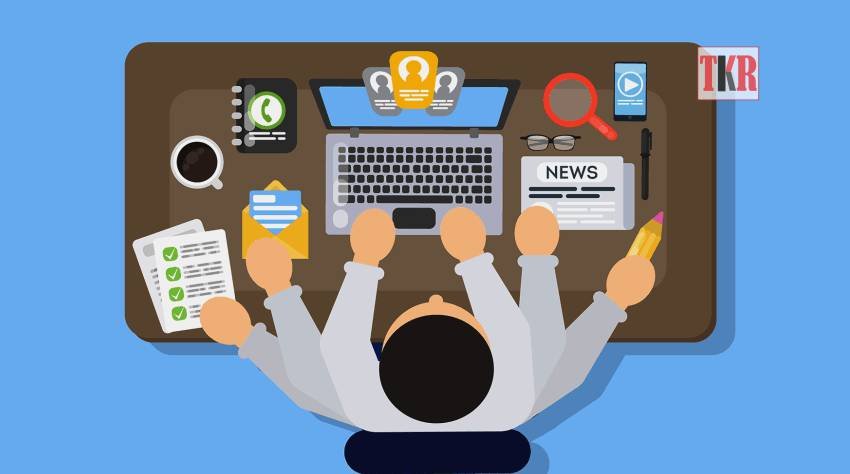In this hectic daily life, we have to accomplish numerous tasks in a very limited period of time to ensure their timely completion. Many people believe that multitasking enhances learning, but, in fact, it interferes with the quality of learning.
Various negative effects of multitasking also take a toll on our learning and performance. It impacts our focus. When working on various tasks like talking on the phone, checking on the email, writing a report, and preparing an excel document, one can lose focus which is required to complete each task properly. Too many tasks break our concentration. As a result, we have to come back to each work individually, figure out what we left, and recreate our thought pattern.
Engaging in numerous tasks at the same time can lead to over simulation of brain function. When there is too much information, it becomes difficult for the brain to differentiate from what is important and what is not. This, in turn, negatively impacts our memory functioning. Multitasking can also have an adverse effect on our lives and livelihood. Additionally, the business and economy will also be affected badly if the employees are constantly distracted.
Today’s world is technology driven and is accompanied by a plethora of information. Surrounded by social media, videos, and games, students are naturally drawn to these distractions during homework. Many students believe that they can accomplish everything by multitasking. But, in reality, by combining various activities like studies, games, listening to music, and other things their productivity is being reduced. All of us suffer from brain-draining inefficiency when our focus is disrupted by multitasking. The consequences can be inadequate sleep, inability to prepare for next day’s learning, or late and low-quality assignments.
The Impact of Multitasking on Brain’s Productivity
All of us may wonder how multitasking has a negative impact on the brain. Ideally, our brain is designed to focus on one thing at a time. Our ancestors needed to focus on only a single thing at a time to survive and thrive in their unpredictable world. We inherited the quality of unifocal tasking from them.
While performing multiple activities at the same time, the brain has to shift its processing from one neural network to another. This results in consumption of time, mental effort, and brain fuel. People waste microseconds, as the brain turns off one active network, and turns on the next. As a result, they do less and remember less.
Activity to Create Neurological Self-Awareness
Parents and teachers can conduct an innovative activity to teach students how multitasking can have adverse effects on time and work efficiency. They can ask their children to make a list of all the activities that they want to carry out while doing their homework (for example, watching TV, browsing the internet, responding to texts/calls/emails, and so on). One should select a subject whose homework assignments take almost the same amount of time each day.
For the chosen subject, parents can collect data about the multitasking items and make a chart based on their own observations. This chart can help to keep record of work accomplished by students with or without any multitasking distraction. The time taken to gather complete data may vary depending on how many tasks a student is engaged in.
After gathering the data, parents can portray to the students, a clear picture of how multitasking distractions waste time and hamper work productivity. They can discuss with their children about what they discovered, what multitask made their brain less efficient, which activities they want to resist, and so on.
Tackling the Urge of Multitasking
For better results, students should realize that instead of multitasking, concentrating on a single work at a time can bear better results. It is very important for them to understand that reading emails and text messages concurrently can divert their concentration, in turn, hampering their studies. However, parents can utilize the below-mentioned techniques to assist their wards in overcoming multitasking for better educational results.
* Parents can limit their wards’ activity related to social media, email, text messaging, listening to music, and so on. They should specify a routine or time table for the students to follow. This will help the students to dedicate time in studies and other activities without multitasking.
* Parents should keep the students’ mobile phones away in silent mode to avoid distractions.
* They should make sure to set time for regular breaks (5 minutes’ break after every 20 minutes over dedicated work). This will relax the students’ brains, knowing that they will get a break for engaging in other activities. They will not be distracted by the feeling of missing out on important things while studying.
* Parents should keep water and healthy snacks nearby for the students. This would reduce their temptation to leave their study area, and would motivate to complete their assignments properly.
Acknowledgement is Imperative
It is very important for students to understand how essential it is to overcome multitasking in order to excel in studies and career. Parents can help children by assessing their performance and constantly supporting them. They should also encourage children to self-assess themselves, and act independently and responsibly towards their studies. Guiding the students to recognize their progress and positive outcomes as a result of their insights and dedication can also be helpful. For better outcomes, parents and teachers should work together as a team, and educate students on how to make proper utilization of time and focus on one activity at a time. Pointing out the importance of time management, and how to avoid procrastination and multitasking can be beneficial to the students. Proper treatment and reminder will keep the students happy, and parents and teachers will also benefit from the same.
— Ananda Kamal Das









